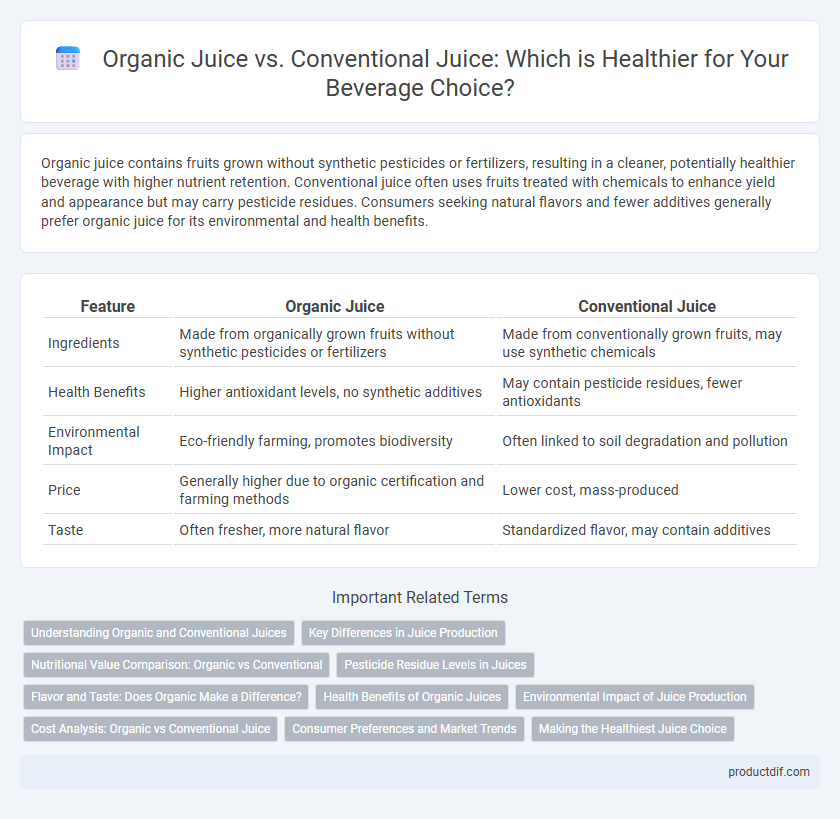Organic juice contains fruits grown without synthetic pesticides or fertilizers, resulting in a cleaner, potentially healthier beverage with higher nutrient retention. Conventional juice often uses fruits treated with chemicals to enhance yield and appearance but may carry pesticide residues. Consumers seeking natural flavors and fewer additives generally prefer organic juice for its environmental and health benefits.
Table of Comparison
| Feature | Organic Juice | Conventional Juice |
|---|---|---|
| Ingredients | Made from organically grown fruits without synthetic pesticides or fertilizers | Made from conventionally grown fruits, may use synthetic chemicals |
| Health Benefits | Higher antioxidant levels, no synthetic additives | May contain pesticide residues, fewer antioxidants |
| Environmental Impact | Eco-friendly farming, promotes biodiversity | Often linked to soil degradation and pollution |
| Price | Generally higher due to organic certification and farming methods | Lower cost, mass-produced |
| Taste | Often fresher, more natural flavor | Standardized flavor, may contain additives |
Understanding Organic and Conventional Juices
Organic juice is made from fruits grown without synthetic pesticides, herbicides, or genetically modified organisms (GMOs), adhering to strict organic farming standards set by organizations like USDA Organic. Conventional juice is derived from fruits cultivated using traditional agricultural methods that may involve chemical fertilizers, pesticides, and genetically engineered seeds. Understanding the differences between organic and conventional juices involves examining factors such as environmental impact, potential pesticide residues, nutritional content, and certification processes.
Key Differences in Juice Production
Organic juice is produced from fruits grown without synthetic pesticides, herbicides, or genetically modified organisms, ensuring a focus on natural farming practices and soil health. Conventional juice often involves the use of chemical fertilizers, pesticides, and additives for pest control and enhanced crop yield. The processing of organic juice typically avoids synthetic preservatives and artificial flavors, while conventional juice may include these to extend shelf life and improve taste consistency.
Nutritional Value Comparison: Organic vs Conventional
Organic juice typically contains higher levels of antioxidants and vitamins such as Vitamin C and polyphenols compared to conventional juice, due to fewer synthetic pesticides and fertilizers used in organic farming. Studies suggest organic juices may have lower pesticide residues and higher concentrations of beneficial nutrients like flavonoids. However, the overall nutritional differences remain modest, with both types providing similar calorie and sugar content.
Pesticide Residue Levels in Juices
Organic juice contains significantly lower pesticide residue levels compared to conventional juice, as organic farming practices prohibit synthetic pesticides. Studies show that conventional juices often contain detectable traces of multiple pesticide residues, which can accumulate and pose health risks over time. Consumers seeking to minimize exposure to harmful chemicals often prefer organic juices for their cleaner, safer ingredient profile.
Flavor and Taste: Does Organic Make a Difference?
Organic juice often delivers a more vibrant and natural flavor profile compared to conventional juice, attributed to the absence of synthetic pesticides and fertilizers that can alter fruit taste. Studies show organic fruits may contain higher levels of certain antioxidants and phytochemicals, enhancing overall juice flavor complexity. Consumer taste tests frequently report a fresher, more authentic juice experience from organic options, highlighting the perceived difference in quality.
Health Benefits of Organic Juices
Organic juices contain higher levels of antioxidants and essential nutrients due to the absence of synthetic pesticides and fertilizers, which can improve immune function and reduce inflammation. These juices are often rich in vitamins like C and E, supporting better skin health and cellular repair. Consuming organic juice reduces exposure to harmful chemicals, promoting overall well-being and lowering the risk of chronic diseases linked to toxin intake.
Environmental Impact of Juice Production
Organic juice production reduces soil degradation by using natural fertilizers and avoiding synthetic pesticides, which helps preserve biodiversity and maintain healthy ecosystems. Conventional juice farming often relies on chemical inputs that contribute to water pollution and greenhouse gas emissions, increasing the environmental footprint. Organic methods promote sustainable water use and lower carbon emissions, making them a more eco-friendly option in juice production.
Cost Analysis: Organic vs Conventional Juice
Organic juice typically costs 30% to 50% more than conventional juice due to higher production expenses such as organic farming practices and certification fees. Conventional juice benefits from economies of scale and lower input costs, making it more affordable for mass consumption. Consumers often weigh the price premium of organic juice against perceived health and environmental benefits when making purchasing decisions.
Consumer Preferences and Market Trends
Consumer preferences increasingly favor organic juice due to perceived health benefits and environmental sustainability, driving significant growth in the organic beverage segment. Market trends reveal that organic juice commands a premium price and is more prevalent in health-conscious demographics and specialty retail channels. Conventional juice remains popular for its affordability and widespread availability but faces declining market share as demand for natural and preservative-free options rises.
Making the Healthiest Juice Choice
Organic juice contains higher levels of antioxidants and fewer pesticides compared to conventional juice, reducing exposure to harmful chemicals. Consumers seeking the healthiest juice choice should prioritize organic options grown without synthetic fertilizers or genetically modified organisms. Nutrient retention is often better in organic juice, supporting overall wellness and immune function more effectively.
Organic Juice vs Conventional Juice Infographic

 productdif.com
productdif.com